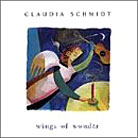February 2001
My first impression was that Schmidt -- like countless other singer-songwriters -- is heavily influenced by Joni Mitchell. The influence is most strongly apparent in Schmidt’s efforts to create melody-chord-lyric combinations that range beyond those typical in the folk, gospel, and R&B traditions. Such a preference eventually led Mitchell to embrace jazz. Schmidt ventures into jazz territory in "Friday the Loveteenth," "My One and Only Love," and "Somebody Else’s Restaurant." Most of the other songs are folk, in the broadest possible sense. Schmidt wrote ten of the dozen songs on the CD. "Hop upon the wings of wonder, let us fly toward the sun/Deep as wells and high as mountains, we will know that all is one/Every creature, winged and footed, every feature, given free/There is no such thing as ugly when the heart can help the eye see," goes the first verse of the title song. It is an obvious way to start the album, since the wonder of beings and things encountered in daily life is Schmidt’s central theme. The single sentence she provides to describe the album’s one instrumental tune, "Peter and Lois Go Round and Round," says, "A little waltz for two dear hearts who teach me so much about embracing life and love." When it comes to the way Schmidt embraces life in her lyrics, I found most of the lines frustratingly abstract. To illustrate my contention, here's the first verse of "Remember" -- a song with a compelling melody and accomplished playing: "There’s a fork in the path that we walk every day/It offers two choices, be true or betray/And each little lie leads us further astray/ From the home where the soul can flourish." Lacking detail, the lines invite one to ask "Who doesn’t know that? What path, what lie, betray what?" Subsequent lines do not answer those questions; they present additional abstractions. "There’s a dry droning sound that is hollow and cruel …." "I will tell you my dreams … will you promise to guard them well …." "There is power in these stories we tell …." What stories? None is contained in the song itself. Some articles written about Schmidt’s earlier work led me to expect humor. I found very little, but her heavy-handed way of singing sometimes obliterates what the words and melody suggest should be lighter moments. The style suggests that the singer fears the listener might miss the profundity, if the tone and inflection didn’t emphasize it. As is increasingly common in popular music, the singing conveys a level of emotion not entirely justified by the lyrics. Schmidt is often described as having a "cult following," and one writer stated that her audience is "fiercely loyal." Perhaps those listeners aren't bothered by that aspect of her approach, or maybe Schmidt doesn't use such an emotional hard-sell on her earlier albums. Schmidt’s rendition of "Wayfaring Stranger," a hymn predating the Civil War, is one of my favorite tracks on the CD. "Stranger …" anticipates what the singer will experience in the great beyond, and lends itself to a preachy singing approach better than do some of Schmidt’s own songs. "I’m going there to meet my mother, she said she’d meet me when I come/I’m just a-going over Jordan, I’m just a-going over home." There is a lot of excellent work on this CD; I suspect the main reason I won't be listening to it often has more to do with Schmidt's decision as to where to place the boundary between singer and listener than to the talent displayed. GO BACK TO: |
 Claudia Schmidt - Wings of Wonder
Claudia Schmidt - Wings of Wonder![[Reviewed on CD]](../format/regcd.gif) Claudia Schmidt’s Wings of Wonder makes you listen closely to
hear what is there. The album's wide variety of music and intricate arrangements make it
tricky to follow some of the lyrics. Fortunately, the words are included in the liner
notes. The notes also inform us that the many instruments -- 6-string and 12-string
guitars, e-bow, mandolin, fiddle, and dulcimer -- are all played by Schmidt and two other
musicians.
Claudia Schmidt’s Wings of Wonder makes you listen closely to
hear what is there. The album's wide variety of music and intricate arrangements make it
tricky to follow some of the lyrics. Fortunately, the words are included in the liner
notes. The notes also inform us that the many instruments -- 6-string and 12-string
guitars, e-bow, mandolin, fiddle, and dulcimer -- are all played by Schmidt and two other
musicians.